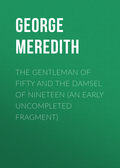
George Meredith
Vittoria. Volume 6
"Ah, Luigi!" she said. "Signorina, only wait, and see how Luigi can serve two," he whispered, writhing under the reproachfulness of her eyes. At the carriage-door she asked Pericles whither he was taking her. "Not to Turin, not to London, Sandra Belloni!" he replied; "not to a place where you are wet all night long, to wheeze for ever after it. Go in." She entered the carriage quickly, to escape from staring officers, whose laughter rang in her ears and humbled her bitterly; she felt herself bringing dishonour on her lover. The carriage continued in the track of the Austrians. Pericles was audibly careful to avoid the border regiments. He showered cigars as he passed; now and then he exhibited a paper; and on one occasion he brought a General officer to the carriage- door, opened it and pointed in. A white-helmeted dragoon rode on each side of the carriage for the remainder of the day. The delight of the supposition that these Austrians were retreating before the invincible arms of King Carlo Alberto kept her cheerful; but she heard no guns in the rear. A blocking of artillery and waggons compelled a halt, and then Pericles came and faced her. He looked profoundly ashamed of himself, ready as he was for an animated defence of his proceedings.
"Where are you taking me, sir?" she said in English.
"Sandra, will you be a good child? It is anywhere you please, if you will promise—"
"I will promise nothing."
"Zen, I lock you up in Verona." In Verona!"
"Sandra, will you promise to me?"
"I will promise nothing."
"Zen I lock you up in Verona. It is settled. No more of it. I come to say, we shall not reach a village. I am sorry. We have soldiers for a guard. You draw out a board and lodge in your carriage as in a bed. Biscuits, potted meats, prunes, bon-bona, chocolate, wine—you shall find all at your right hand and your left. I am desolate in offending you. Sandra, if you will promise—"
"I will promise—this is what I will promise," said Vittoria.
Pericles thrust his ear forward, and withdrew it as if it had been slapped.
She promised to run from him at the first opportunity, to despise him ever after, and never to sing again in his hearing. With the darkness Luigi appeared to light her lamp; he mouthed perpetually, "To-morrow, to- morrow." The watch-fires of Austrians encamped in the fields encircled her; and moving up and down, the cigar of Antonio-Pericles was visible. He had not eaten or drunk, and he was out there sleepless; he walked conquering his fears in the thick of war troubles: all for her sake. She watched critically to see whether the cigar-light was puffed in fretfulness. It burned steadily; and the thought of Pericles supporting patience quite overcame her. In a fit of humour that was almost tears, she called to him and begged him to take a place in the carriage and have food. "If it is your pleasure," he said; and threw off his cloak. The wine comforted him. Thereupon he commenced a series of strange gesticulations, and ended by blinking at the window, saying, "No, no; it is impossible to explain. I have no voice; I am not, gifted. It is," he tapped at his chest, "it is here. It is, imprisoned in me."
"What?" said Vittoria, to encourage him.
"It can never be explained, my child. Am I not respectful to you? Am I not worshipful to you? But, no! it can never be explained. Some do call me mad. I know it; I am laughed at. Oh! do I not know zat? Perfectly well. My ancestors adored Goddesses. I discover ze voice of a Goddess: I adore it. So you call me mad; it is to me what you call me— juste ze same. I am possessed wiz passion for her voice. So it will be till I go to ashes. It is to me ze one zsing divine in a pig, a porpoise world. It is to me—I talk! It is unutterable—impossible to tell."
"But I understand it; I know you must feel it," said Vittoria.
"But you hate me, Sandra. You hate your Pericles."
"No, I do not; you are my good friend, my good Pericles."
"I am your good Pericles? So you obey me?"
"In what?"
"You come to London?"
"I shall not."
"You come to Turin?"
"I cannot promise."
"To Milan?"
"No; not yet."
Ungrateful little beast! minx! temptress! You seduce me into your carriage to feed me, to fill me, for to coax me," cried Pericles.
"Am I the person to have abuse poured on me?" Vittoria rejoined, and she frowned. "Might I not have called you a wretched whimsical money- machine, without the comprehension of a human feeling? You are doing me a great wrong—to win my submission, as I see, and it half amuses me; but the pretence of an attempt to carry me off from my friends is an offence that I should take certain care to punish in another. I do not give you any promise, because the first promise of all—the promise to keep one— is not in my power. Shut your eyes and sleep where you are, and in the morning think better of your conduct!"
"Of my conduct, mademoiselle! "Pericles retained this sentence in his head till the conclusion of her animated speech,—"of my conduct I judge better zan to accept of such a privilege as you graciously offer to me;" and he retired with a sour grin, very much subdued by her unexpected capacity for expression. The bugles of the Austrians were soon ringing. There was a trifle of a romantic flavour in the notes which Vittoria tried not to feel; the smart iteration of them all about her rubbed it off, but she was reduced to repeat them, and take them in various keys. This was her theme for the day.
They were in the midst of mulberries, out of sight of the army; green mulberries, and the green and the bronze young vine-leaf. It was a delicious day, but she began to fear that she was approaching Verona, and that Pericles was acting seriously. The bronze young vine-leaf seemed to her like some warrior's face, as it would look when beaten by weather, burned by the sun. They came now to inns which had been visited by both armies. Luigi established communication with the innkeepers before the latter had stated the names of villages to Pericles, who stood map in hand, believing himself at last to be no more conscious of his position than an atom in a whirl of dust. Vittoria still refused to give him any promise, and finally, on a solitary stretch of the road, he appealed to her mercy. She was the mistress of the carriage, he said; he had never meant to imprison her in Verona; his behaviour was simply dictated by his adoration—alas! This was true or not true, but it was certain that the ways were confounded to them. Luigi, despatched to reconnoitre from a neighbouring eminence, reported a Piedmontese encampment far ahead, and a walking tent that was coming on their route. The walking tent was an enormous white umbrella. Pericles advanced to meet it; after an interchange of opening formalities, he turned about and clapped hands. The umbrella was folded. Vittoria recognized the last man she would then have thought of meeting; he seemed to have jumped out of an ambush from Meran in Tyrol:—it was Wilfrid. Their greeting was disturbed by the rushing up of half-a-dozen troopers. The men claimed him as an Austrian spy. With difficulty Vittoria obtained leave to drive him on to their commanding officer. It appeared that the white umbrella was notorious for having been seen on previous occasions threading the Piedmontese lines into and out of Peschiera. These very troopers swore to it; but they could not swear to Wilfrid, and white umbrellas were not absolutely uncommon. Vittoria declared that Wilfrid was an old English friend; Pericles vowed that Wilfrid was one of their party. The prisoner was clearly an Englishman. As it chanced, the officer before whom Wilfrid was taken had heard Vittoria sing on the great night at La Scala. "Signorina, your word should pass the Austrian Field-Marshal himself," he said, and merely requested Wilfrid to state on his word of honour that he was not in the Austrian service, to which Wilfrid unhesitatingly replied, "I am not."
Permission was then accorded to him to proceed in the carriage.
Vittoria held her hand to Wilfrid. He took the fingers and bowed over them.
He was perfectly self-possessed, and cool even under her eyes. Like a pedlar he carried a pack on his back, which was his life; for his business was a combination of scout and spy.
"You have saved me from a ditch to-day," he said; "every fellow has some sort of love for his life, and I must thank you for the odd luck of your coming by. I knew you were on this ground somewhere. If the rascals had searched me, I should not have come off so well. I did not speak falsely to that officer; I am not in the Austrian service. I am a volunteer spy. I am an unpaid soldier. I am the dog of the army—fetching and carrying for a smile and a pat on the head. I am ruined, and I am working my way up as best I can. My uncle disowns me. It is to General Schoneck that I owe this chance of re-establishing myself. I followed the army out of Milan. I was at Melegnano, at Pastrengo, at Santa Lucia. If I get nothing for it, the Lenkensteins at least shall not say that I abandoned the flag in adversity. I am bound for Rivoli. The fortress (Peschiera) has just surrendered. The Marshal is stealing round to make a dash on Vicenza." So far he spoke like one apart from her, but a flush crossed his forehead. "I have not followed you. I have obeyed your brief directions. I saw this carriage yesterday in the ranks of our troops. I saw Pericles. I guessed who might be inside it. I let it pass me. Could I do more?"
"Not if you wanted to punish me," said Vittoria.
She was afflicted by his refraining from reproaches in his sunken state.
Their talk bordered the old life which they had known, like a rivulet, coming to falls where it threatens to be e, torrent and a flood; like flame bubbling the wax of a seal. She was surprised to find herself expecting tenderness from him: and, startled by the languor in her veins, she conceived a contempt for her sex and her own weak nature. To mask that, an excessive outward coldness was assumed. "You can serve as a spy, Wilfrid!"
The answer was ready: "Having twice served as a traitor, I need not be particular. It is what my uncle and the Lenkensteins call me. I do my best to work my way up again. Despise me for it, if you please."
On the contrary, she had never respected him so much. She got herself into opposition to him by provoking him to speak with pride of his army; but the opposition was artificial, and she called to Carlo Ammiani in heart. "I will leave these places, cover up my head, and crouch till the struggle is decided."
The difficulty was now to be happily rid of Wilfrid by leaving him in safety. Piedmontese horse scoured the neighbourhood, and any mischance that might befall him she traced to her hand. She dreaded at every instant to hear him speak of his love for her; yet how sweet it would have been to hear it,—to hear him speak of passionate love; to shape it in deep music; to hear one crave for what she gave to another! "I am sinking: I am growing degraded," she thought. But there was no other way for her to quicken her imagination of her distant and offended lover. The sights on the plains were strange contrasts to these conflicting inner emotions: she seemed to be living in two divided worlds.
Pericles declared anew that she was mistress of the carriage. She issued orders: "The nearest point to Rivoli, and then to Brescia."
Pericles broke into shouts. "She has arrived at her reason! Hurrah for Brescia! I beheld you," he confessed to Wilfrid,—"it was on ze right of Mincio, my friend. I did not know you were so true for Art, or what a hand I would have reached to you! Excuse me now. Let us whip on. I am your banker. I shall desire you not to be shot or sabred. You are deserving of an effigy on a theatral grand stair-case!" His gratitude could no further express itself. In joy he whipped the horses on. Fools might be fighting—he was the conqueror. From Brescia, one leap took him in fancy to London. He composed mentally a letter to be forwarded immediately to a London manager, directing him to cause the appearance of articles in the journals on the grand new prima donna, whose singing had awakened the people of Italy.
Another day brought them in view of the Lago di Garda. The flag of Sardinia hung from the walls of Peschiera. And now Vittoria saw the Pastrengo hills—dear hills, that drove her wretched languor out of her, and made her soul and body one again. The horses were going at a gallop. Shots were heard. To the left of them, somewhat in the rear, on higher ground, there was an encounter of a body of Austrians and Italians: Tyrolese riflemen and the volunteers. Pericles was raving. He refused to draw the reins till they had reached the village, where one of the horses dropped. From the windows of the inn, fronting a clear space, Vittoria beheld a guard of Austrians surrounding two or more prisoners. A woman sat near them with her head buried in her lap. Presently an officer left the door of the inn and spoke to the soldiers. "That is Count Karl von Lenkenstein," Wilfrid said in a whisper. Pericles had been speaking with Count Karl and came up to the room, saying, "We are to observe something; but we are safe; it is only fortune of war." Wilfrid immediately went out to report himself. He was seen giving his papers, after which Count Karl waved his finger back to the inn, and he returned. Vittoria sprang to her feet at the words he uttered. Rinaldo Guidascarpi was one of the prisoners. The others Wilfrid professed not to know. The woman was the wife of Barto Rizzo.
In the great red of sunset the Tyrolese riflemen and a body of Italians in Austrian fatigue uniform marched into the village. These formed in the space before the inn. It seemed as if Count Karl were declaiming an indictment. A voice answered, "I am the man." It was clear and straight as a voice that goes up in the night. Then a procession walked some paces on. The woman followed. She fell prostrate at the feet of Count Karl. He listened to her and nodded. Rinaldo Guidascarpi stood alone with bandaged eyes. The woman advanced to him; she put her mouth on his ear; there she hung.
Vittoria heard a single shot. Rinaldo Guidascarpi lay stretched upon the ground. and the woman stood over him.







